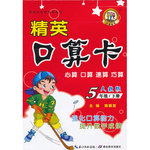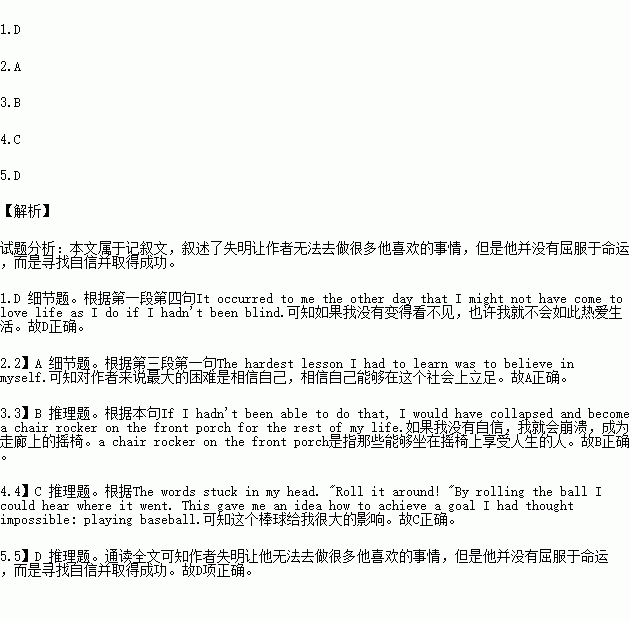题目内容
I lost my sight when I was four years old by falling off a box car in a freight yard in Atlantic City and landing on my head. Now I am thirty two. I can vaguely remember the brightness of sunshine and what color red is. It would be wonderful to see again, but a calamity can do strange things to people. It occurred to me the other day that I might not have come to love life as I do if I hadn't been blind. I believe in life now. I am not so sure that I would have believed in it so deeply, otherwise. I don't mean that I would prefer to go without my eyes. I simply mean that the loss of them made me appreciate the more what I had left.
Life, I believe, asks a continuous series of adjustments to reality. The more readily a person is able to make these adjustments, the more meaningful his own private world becomes. The adjustment is never easy. I was bewildered and afraid. But I was lucky. My parents and my teachers saw something in me--a potential to live, you might call it--which I didn't see, and they made me want to fight it out with blindness.
The hardest lesson I had to learn was to believe in myself. That was basic. If I hadn't been able to do that, I would have collapsed and become a chair rocker on the front porch for the rest of my life. When I say belief in myself I am not talking about simply the kind of self confidence that helps me down an unfamiliar staircase alone. That is part of it. But I mean something bigger than that: an assurance that I am, despite imperfections, a real, positive person; that somewhere in the sweeping, intricate pattern of people there is a special place where I can make myself fit.
It took me years to discover and strengthen this assurance. It had to start with the most elementary things. Once a man gave me an indoor baseball. I thought he was mocking me and I was hurt. "I can't use this." I said. "Take it with you," he urged me, "and roll it around." The words stuck in my head. "Roll it around! "By rolling the ball I could hear where it went. This gave me an idea how to achieve a goal I had thought impossible: playing baseball. At Philadelphia's Overbrook School for the Blind I invented a successful variation of baseball. We called it ground ball.
All my life I have set ahead of me a series of goals and then tried to reach them, one at a time. I had to learn my limitations. It was no good to try for something I knew at the start was wildly out of reach because that only invited the bitterness of failure. I would fail sometimes anyway but on the average I made progress.
1.We can learn from the beginning of the passage that __________________.
A. the author lost his sight because of a car crash.
B. the disaster strengthened the author's desire to see
C. the disaster made the author appreciate what he had.
D. the author wouldn't love life if the disaster didn't happen.
2.What's the most difficult thing for the author?
A. Building up assurance that he can find his place in life.
B. To find a special work that suits the author.
C. Learning to manage his life alone.
D. How to adjust himself to reality.
3.According to the context, "a chair rocker on the front porch" in paragraph 3 means that the author
A. was paralyzed and stayed in a rocking chair.
B. would sit in a rocking chair and enjoy his life.
C. would sit in a chair and stay at home.
D. would lose his will to struggle against difficulties.
4.According to the passage, the baseball and encouragement offered by the man
A. inspired the author.
B. hurt the author's feeling.
C. gave the author a deep impression
D. directly led to the invention of ground ball.
5. According to the passage, which of the following is CORRECT?
A. The author set goals for himself but only invited failure most of the time.
B. The author suggested not trying something beyond one's ability at the beginning.
C. Because of his limitations, the author tried to reach one goal at a time.
D. The bitterness of failure prevented the author from trying something out of reach.
 精英口算卡系列答案
精英口算卡系列答案
